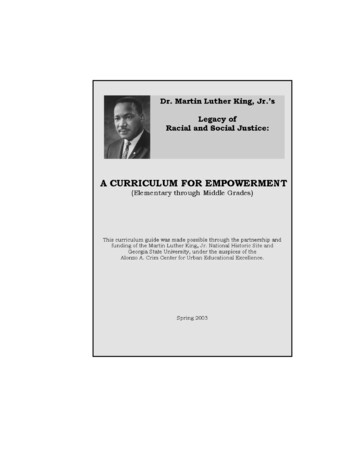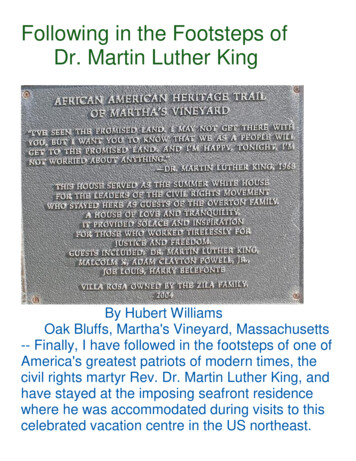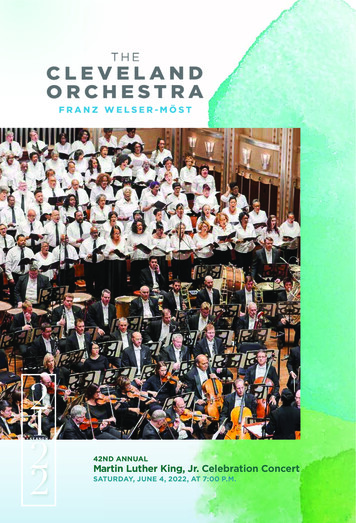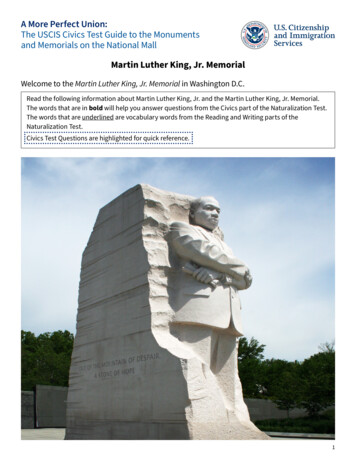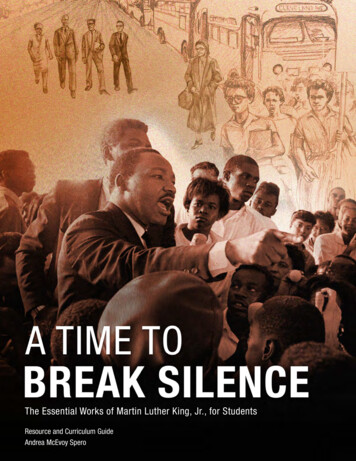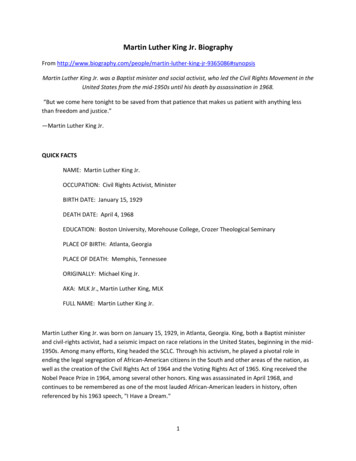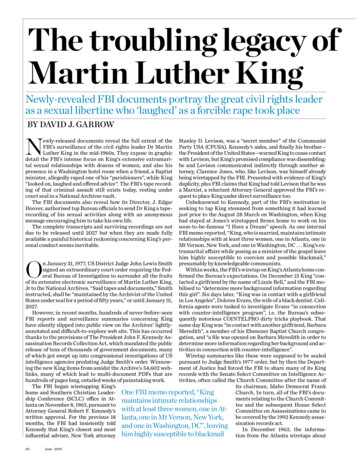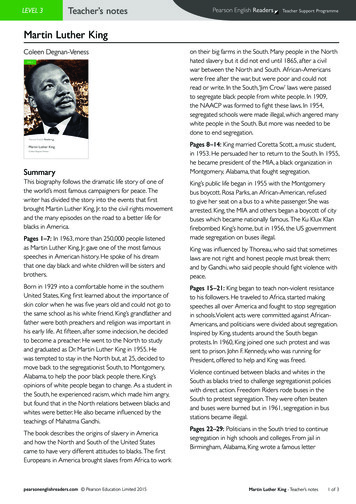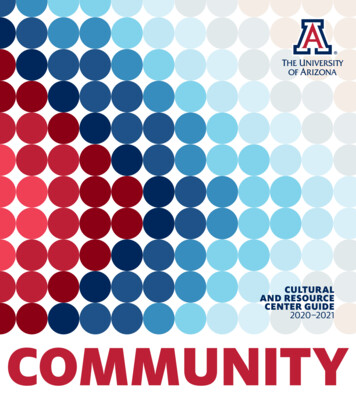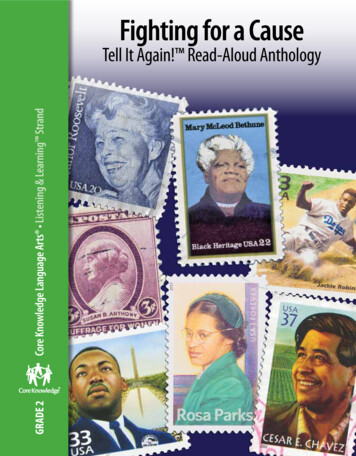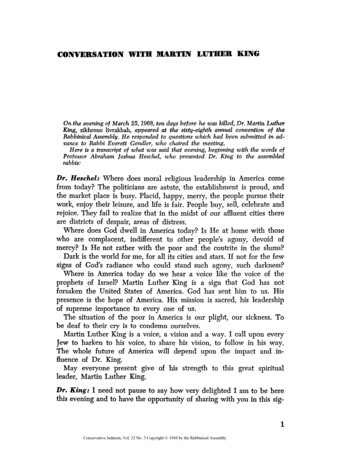
Transcription
CONVERSATION W ITH MARTIN LIJTRER KINGOn the evening of March 25,1968, ten days before he was killed, Dr. Martin LutherKing, zikhrono livrakhah, appeared at the sixty-eighth annual convention of theRabbinical Assembly. He responded to questions which had been submitted in advance to Rabbi Everett Gendler, who chaired the meeting.Here is a transcript of what was said that evening, beginning with the words ofProfessor Abraham Joshua Heschel, who presented Dr. King to the assembledrabbis:Dr. Heschel: Where does moral religious leadership in America comefrom today? The politicians are astute, the establishment is proud, andthe market place is busy. Placid, happy, merry, the people pursue theirwork, enjoy their leisure, and life is fair. People buy, sell, celebrate andrejoice. They fail to realize that in the midst of our affluent cities thereare districts of despair, areas of distress.Where does God dwell in America today? Is He at home with thosewho are complacent, indifferent to other people’s agony, devoid ofmercy? Is He not rather with the poor and the contrite in the slums?Dark is the world for me, for all its cities and stars. If not for the fewsigns of God’s radiance who could stand such agony, such darkness?Where in America today do w e hear a voice like the voice of theprophets of Israel? Martin Luther King is a sign that God has notforsaken the United States of America. God has sent him to us. Hispresence is the hope of America. His mission is sacred, his leadershipof supreme importance to every one of us.The situation of the poor in America is our plight, our sickness. Tobe deaf to their cry is to condemn ourselves.Martin Luther King is a voice, a vision and a way. I call upon everyJew to harken to his voice, to share his vision, to follow in his way.The whole future of America will depend upon the impact and influence of Dr. King.May everyone present give of his strength to this great spiritualleader, Martin Luther King.Dr. King: I need not pause to say how very delighted I am to be herethis evening and to have the opportunity of sharing with you in this sig1Conservative Judaism, Vol. 22 No. 3 Copyright 1968 by the Rabbinical Assembly
nificant meeting, but I do want to express my deep personal appreciation to each of you for extending the invitation. It is always a very richand rewarding experience when I can take a brief break from the dayto-day demands of our struggle for freedom and human dignity anddiscuss the issues involved in that struggle with concerned friends ofgood will all over our nation. And so I deem this a real and a greatopportunity.Another thing that I would like to mention is that I have heard “W eShall Overcome” probably more than I have heard any other song overthe last few years. It is something of the theme song of our struggle,but tonight was the first time that I ever heard “W e Shall Overcome”in Hebrew, so that, too, was a beautiful experience for me, to hearthat great song in Hebrew.It is also a wonderful experience to be here on the occasion of thesixtieth birthday of a man that I consider one of the truly great menof our day and age, Rabbi Heschel. He is indeed a truly great prophet.Iv e looked over the last few years, being involved in the strugglefor racial justice, and all too often I have seen religious leaders standamid the social injustices that pervade our society, mouthing piousirrelevancies and sanctimonious trivialities. All too often the religiouscommunity has been a tail light instead of a head light.But here and there we find those who refuse to remain silent behindthe safe security of stained glass windows, and they are forever seekingto make the great ethical insights of our Judeo-Christian heritage relevant in this day and in this age. I feel that Rabbi Heschel is one of thepersons who is relevant at all times, always standing with propheticinsights to guide us through these difficult days.He has been with us in many of our struggles. I remember marchingfrom Selma to Montgomery, how he stood at my side and with us asw e faced that crisis situation. I remember very well when w e were inChicago for the Conference on Religion and Race. Eloquently andprofoundly he spoke on the issues of race and religion, and to a greatextent his speech inspired clergymen of all the religious faiths of ourcountry; many went out and decided to do something that they hadnot done before. So I am happy to be with him, and I want to sayHappy Birthday, and I hope I can be here to celebrate your onehundredth birthday.I am not going to make a speech. W e must get right to your questions. I simply want to say that we do confront a crisis in our nation,a crisis born of many problems. W e see on every hand the restlessnessof the comfortable and the discontent of the affluent, and somehow it2
Conversation with M artin Luther Kingseems that this mammoth ship of state is not moving toward new andmore secure shores but toward old, destructive rocks.It seems to me that all people of good will must now take a standfor that which is just, that which is righteous. Indeed, in the wordsof the prophet Amos, “Let justice roll down like the waters and righteousness like a mighty stream.”Our priorities are mixed up, our national purposes are confused, ourpolicies are confused, and there must somehow be a reordering ofpriorities, policies and purposes. I hope, as we discuss these issues tonight, that together we will be able to find some guidelines and somesense of direction.Rabbi Everett Gendler: W e begin now with some of the batches ofquestions. And since the question of confusion came up, and the problem of politics, perhaps we can begin with two or three questions whichare rather immediate and relate to some very recent developments. Onequestion is, “At this point, who is your candidate for President?” Onequestion is, “If as it now seems Johnson and Nixon are nominated, doyou have any suggestions as an alternative for those seeking a voicein the profound moral issues of the day?” And a third question in thisgeneral area of immediacy, “Would you please comment on Congressman Powell's charge that you are a moderate, that you cater to Whitey,and also his criticism that you do not accept violence?” Some criticism!Dr. King: Well, let me start with the first question. That is relativelyeasy for me because I have followed the policy of not endorsingcandidates.Somebody is saying stand, so I guess Til have to . . .Rabbi Gendler: Might I say that since Dr. King anticipates a goodbit of footwork next month, we thought perhaps this particular eveninghe could remain off his feet.Dr. King: 111 stand.On the first question, I was about to say that I don’t endorse candidates. That has been a policy in the Southern Christian Leadership Conference. W e are a non-partisan organization. However, I do think theissues in this election are so crucial that it will be impossible for usto absolutely follow the past policy. I do think the voters of our nationneed an alternative in the 1968 election, but I think w e are in badshape finding that alternative with simply Johnson on the one handand Nixon on the other hand. I don’t see the alternative there. Consequently, I must look elsewhere. I think in the candidacy of bothSenator Kennedy and Senator McCarthy w e see an alternative. It is notdefinite, as you know, that President Johnson will be renominated. Of
course, we haven't had a situation since 1884 when an incumbent President was not renominated, if he wanted the nomination. But these aredifferent days and it may well be that something will happen to makeit possible for an alternative to develop within the Democratic partyitself.I think very highly of both Senator McCarthy and Senator Kennedy.I think they are both very competent men. I think they are relevant onthe issues that are close to our hearts, and I think they are bothdedicated men. So I would settle with either man being nominated bythe Democratic party.On the question of Congressman Powell and his recent accusation,I must say that I would not want to engage in a public or privatedebate with Mr. Powell on his views concerning Martin Luther King.Frankly, I hope I am so involved in trying to do a job that has to bedone that I will not come to the point of dignifying some of the statements that the Congressman has made.I would like to say, however, on the question of being a moderate,that I always have to understand what one means. I think moderationon the one hand can be a vice; I think on the other hand it can be avirtue. If by moderation w e mean moving on through this tense periodof transition with wise restraint, calm reasonableness, yet militant action, then moderation is a great virtue which all leaders should seek toachieve. But if moderation means slowing up in the move for justiceand capitulating to the whims and caprices of the guardians of thedeadening status quo, then moderation is a tragic vice which all menof good will must condemn.I don’t see anything in the work that we are trying to do in theSouthern Christian Leadership Conference which is suggestive of slowing up, which is suggestive of not taking a strong stand and a strongresistance to the evils of racial injustice. W e have always stood upagainst injustices. W e have done it militantly. Now, so often the word“militant” is misunderstood because most people think of militancy inmilitary terms. But to be militant merely means to be demanding andto be persistent, and in this sense I think the non-violent movementhas demonstrated great militancy. It is possible to be militantly nonviolent.On the question of appealing to “Whitey,” I don’t quite know whatthe Congressman means. But here again I think this is our problemwhich must be worked out by all people of good will, black and white.I feel that at every point w e must make it very clear that this isn’tjust a Negro problem, that white Americans have a responsibility, in-4
Conversation with M artin Luther Kingdeed a great responsibility, to work passionately and unrelentingly forthe solution of the problem of racism, and if that means constantlyreminding white society of its obligation, that must be done. If I havebeen accused of that, then I will have to continue to be accused.Finally, I have not advocated violence. The Congressman is quiteright. I haven’t advocated violence, because I do not see it as theanswer to the problem. I do not see it as the answer from a moral pointof view and I do not see it as the answer from a practical point ofview. I am still convinced that violence as the problematic strategyin our struggle to achieve justice and freedom in the United Stateswould be absolutely impractical and it would lead to a dead-end street.We would end up creating many more social problems than w e solve,and unborn generations would be the recipients of a long and desolatenight of bitterness. Therefore, I think non-violence, militantly conceivedand executed, well-organized, is the most potent weapon available tothe black man in his struggle for freedom and human dignity.Rabbi Gendler: Having raised several points that some of the questionsreferred to, we may proceed by a further exploration of some of theseelements, Dr. King, and perhaps we could begin with several questionsthat relate to your evaluation of the internal mood of the black community.Let me share some of the formulations of these questions with you.“How representative is the extremist element of the Negro community?”“How do we know who really represents the Negro community?” “Ifwe are on a committee and there is a Negro militant and a Negromoderate, how shall a concerned white conduct himself?”“What is your view of the thinking in some Negro circles whichprefers segregation and separatism, improving the Negro’s lot withinthis condition? How do you see Black Power in this respect?”“Black militants want complete separation. You speak of integration.How do you reconcile the two?”“How can you work with those Negroes who are in complete opposition to your view, and I believe correct view, of integration?”Dr. King: Let me start off with the question, “How representative arethe extremist elements in the black community?” I assume when wesay extremist elements we mean those who advocate violence, whoadvocate separatism as a goal. The fact is that these persons representa very small segment of the Negro community at the present time. Idon’t know how the situation will be next year or the year after next,but at the present time the vast majority of Negroes in the United5
States feel that non-violence is the most effective method to deal withthe problems that w e face.Polls have recently revealed this, as recently as two or three monthsago. Fortune magazine conducted a pretty intensive poll, others haveconducted such polls, and they reveal that about 92 percent of theNegroes of America feel that there must be some non-violent solutionto the problem of racial injustice. The Fortune poll also revealed thatthe vast majority of the Negroes still feel that the ultimate solution tothe problem will come through a meaningfully integrated society.Now let me move into the question of integration and separation bydealing with the question of Black Power. I’ve said so often that I regretthat the slogan Black Power came into being, because it has been soconfusing. It gives the wrong connotation. It often connotes the questfor black domination rather than black equality. And it is just liketelling a joke. If you tell a joke and nobody laughs at the joke and youhave to spend the rest of the time trying to explain to people why theyshould laugh, it isn’t a good joke. And that is what I have always saidabout the slogan Black Power. You have to spend too much time explaining what you are talking about. But it is a slogan that we haveto deal with now.I debated with Stokely Carmichael all the way down the highwaysof Mississippi, and I said, “Well, let’s not use this slogan. Let’s get thepower. A lot of ethnic groups have power, and I didn’t hear themmarching around talking about Irish Power or Jewish Power; they justwent out and got the power; let’s go out and get the power.” But somehow w e managed to get just the slogan.I think everybody ought to understand that there are positives inthe concept of Black Power and the slogan, and there are negatives.Let me briefly outline the positives. First, Black Power in the positivesense is a psychological call to manhood. This is desperately needed inthe black community, because for all too many years black people havebeen ashamed of themselves. All too many black people have beenashamed of their heritage, and all too many have had a deep sense ofinferiority, and something needed to take place to cause the blackman not to be ashamed of himself, not to be ashamed of his color, notto be ashamed of his heritage.It is understandable how this shame came into being. The nationmade the black man’s color a stigma. Even linguistics and semanticsconspire to give this impression. If you look in Roget’s Thesaurus youwill find about 120 synonyms for black, and right down the line youwill find words like smut, something dirty, worthless, and useless, and6
Conversation with M artin Luther Kingthen you look further and you find about 130 synonyms for white andthey all represent something high, noble, pure, chaste-right down theline. In our language structure, a white he is a little better than a blacklie. Somebody goes wrong in the family and we don't call him a whitesheep, w e call him a black sheep. W e don’t say whitemail, but blackmail. W e don't speak of white-balling somebody, but black-ballingsomebody.The word black itself in our society connotes something that is degrading. It was absolutely necessary to come to a moment with a senseof dignity. It is very positive and very necessary. So if we see BlackPower as a psychological call to manhood and black dignity, I thinkthat's a positive attitude that I want my children to have. I don't wantthem to be ashamed of the fact that they are black and not white.Secondly, Black Power is pooling black political resources in orderto achieve our legitimate goals. I think that this is very positive, andit is absolutely necessary for the black people of America to achievepolitical power by pooling political resources. In Cleveland this summer w e did engage in a Black Power move. There's no doubt aboutthat. I think most people of good will feel it was a positive move.The same is true of Gary, Indiana. The fact is that Mr. Hatcher couldnot have been elected in Gary if black people had not voted in a blocand then joined with a coalition of liberal whites. In Cleveland, blackpeople voted in a bloc for Carl Stokes, joining with a few liberalwhites. This was a pooling of resources in order to achieve politicalpower.Thirdly, Black Power in its positive sense is a pooling of black economic resources in order to achieve legitimate power. And I think thereis much that can be done in this area. W e can pool our resources, wecan cooperate, in order to bring to bear on those who treat us unjustly.We have a program known as Operation Breadbasket in SCLC, andit is certainly one of the best programs w e have. It is a very effectiveprogram and it's a simple program. It is just a program which demandsa certain number of jobs from the private sector—that is, from businessesand industry. It demands a non-discriminatory policy in housing. Ifthey don't yield, w e don’t argue with them, we don't curse them, wedon't burn the store down. W e simply go back to our people and wesay that this particular company is not responding morally to the question of jobs, to the question of being just and humane toward theblack people of the community, and w e say that as a result of this w emust withdraw our economic support.That's Black Power in a real sense. W e have achieved some very
significant gains and victories as a result of this program, because theblack man collectively now has enough buying power to make thedifference between profit and less in any major industry or concern ofour country. Withdrawing economic support from those who will notbe just and fair in their dealings is a very potent weapon.Political power and economic power are needed, and I think theseare the positives of Black Power.I would see the negatives in two terms. First, in terms of blackseparatism. As I said, most Negroes do not believe in black separatismas the ultimate goal, but there are some who do and they talk in termsof totally separating themselves from white America. They talk in termsof separate states, and they really mean separatism as a goal. In thissense I must say that I see it as a negative because it is very unrealistic.The fact is that we are tied together in an inescapable network ofmutuality. Whether we like it or not and whether the racist understands it or not, our music, our cultural patterns, our poets, our materialprosperity and even our food, are an amalgam of black and white, andthere can be no separate black path to power and fulfillment that doesnot ultimately intersect white routes. There can be no separate whitepath to power and fulfillment, short of social disaster, that does notrecognize the necessity of sharing that power with black aspirations forfreedom and justice.This leads me to say another thing, and that is that it isn’t enough totalk about integration without coming to see that integration is morethan something to be dealt with in esthetic or romantic terms. I thinkin the past all too often we did it that way. W e talked of integrationin romantic and esthetic terms and it ended up as merely adding colorto a still predominantly white power structure.What is necessary now is to see integration in political terms wherethere is sharing of power. When we see integration in political terms,then we recognize that there are times when w e must see segregationas a temporary way-station to a truly integrated society. There aremany Negroes who feel this; they do not see segregation as the ultimategoal. They do not see separation as the ultimate goal. They see it asa temporary way-station to put them into a bargaining position to getto that ultimate goal, which is a truly integrated society where thereis shared power.I must honestly say that there are points at which I share this view.There are points at which I see the necessity for temporary segregationin order to get to the integrated society. I can point to some cases.Iv e seen this in the South, in schools being integrated and I’ve seen it8
Conversation with M artin Luther Kingwith Teachers' Associations being integrated. Often when they merge,the Negro is integrated without power. The two or three positions ofpower which he did have in the separate situation passed away altogether, so that he lost his bargaining position, he lost his power, andhe lost his posture where he could be relatively militant and reallygrapple with the problems. W e don’t want to be integrated out ofpower; w e want to be integrated into power.And this is why I think it is absolutely necessary to see integrationin political terms, to see that there are some situations where separationmay serve as a temporary way-station to the ultimate goal which weseek, which I think is the only answer in the final analysis to theproblem of a truly integrated society.I think this is the mood which we find in the black community, generally, and this means that w e must work on two levels. In every citywe have a dual society. This dualism runs in the economic market. Inevery city, we have two economies. In every city, we have two housingmarkets. In every city, we have two school systems. This duality hasbrought about a great deal of injustice, and I don’t need to go intoall that because we are all familiar with it.In every city, to deal with this unjust dualism, we must constantlywork toward the goal of a truly integrated society while at the sametime we enrich the ghetto. W e must seek to enrich the ghetto immediately in the sense of improving the housing conditions, improvingthe schools in the ghetto, improving the economic conditions. At thesame time, we must be working to open the housing market so therewill be one housing market only. W e must work on two levels. W eshould gradually move to disperse the ghetto, and immediately move toimprove conditions within the ghetto, which in the final analysis willmake it possible to disperse it at a greater rate a few years from now.Rabbi Gendler: Considering both the enlightenment and encouragement which I think many of us received just now from Dr. Kingsportrayal of the prevalent mood in the black community, w e mightmove on to another complex of questions relating, Dr. King, to theprevailing mood in the black community which also would benefit fromsome clarification by you. This is what w e might call the area of blackand Jewish communal relations.“What steps have been undertaken and what success has been notedin convincing anti-Semitic and anti-Israel Negroes, such as Rap Brown,Stokely Carmichael, and McKissick, to desist from their anti-Israel activity?” “What effective measures will the collective Negro community9
take against the vicious anti-Semitism, against the militance and therabble-rousing of the Browns, Carmichaels, and Powells?”“Have your contributions from Jews fallen off considerably? Do youfeel the Jewish community is copping out on the civil rights struggle?”“What would you say if you were talking to a Negro intellectual, aneditor of a national magazine, and were told, as I have been, that hesupported the Arabs against Israel because color is all important inthis world? In the editor’s opinion, the Arabs are colored Asians andthe Israelis are white Europeans. Would you point out that more thanhalf of the Israelis are Asian Jews with the same pigmentation as Arabs,or would you suggest that an American Negro should not form judgments on the basis of color? What seems to you an appropriate or aneffective response?”Dr. King: Thank you. Im glad that question came up because I thinkit is one that must be answered honestly and forthrightly.First let me say that there is absolutely no anti-Semitism in the blackcommunity in the historic sense of anti-Semitism. Anti-Semitism historically has been based on two false, sick, evil assumptions. One wasunfortunately perpetuated even by many Christians, all too many asa matter of fact, and that is the notion that the religion of Judaism isanathema. That was the first basis for anti-Semitism in the historic sense.Second, a notion was perpetuated by a sick man like Hitler and othersthat the Jew is innately inferior. Now in these two senses, there is virtually no anti-Semitism in the black community. There is no philosophical anti-Semitism or anti-Semitism in the sense of the historic evils ofanti-Semitism that have been with us all too long.I think we also have to say that the anti-Semitism which w e find inthe black community is almost completely an urban Northern ghettophenomenon, virtually non-existent in the South. I think this comesinto being because the Negro in the ghetto confronts the Jew in twodissimilar roles. On the one hand, he confronts the Jew in the role ofbeing his most consistent and trusted ally in the struggle for justice inthe civil rights movement. Probably more than any other ethnic group,the Jewish community has been sympathetic and has stood as an allyto the Negro in his struggle for justice.On the other hand, the Negro confronts the Jew in the ghetto as hislandlord in many instances. H e confronts the Jew as the owner of thestore around the corner where he pays more for what he gets. InAtlanta, for instance, I live in the heart of the ghetto, and it is an actualfact that my w ife in doing her shopping has to pay more for food thanwhites have to pay out in Buckhead and Lennox. W eve tested it. We10
Conversation with M artin Luther Ringhave to pay five cents and sometimes ten cents a pound more for almostanything that we get than they have to pay out in Buckhead andLennox Square where the rich people of Atlanta live.The fact is that the Jewish storekeeper or landlord is not operatingon the basis of Jewish ethics; he is operating simply as a marginalbusinessman. Consequently the conflicts come into being.I remember when w e were working in Chicago two years ago, wehad numerous rent strikes on the West Side. And it was unfortunatelytrue that the persons whom w e had to conduct these strikes againstwere in most instances Jewish landlords. Now sociologically that cameinto being because there was a time when the West Side of Chicagowas almost a Jewish community. It was a Jewish ghetto, so to speak,and when the Jewish community started moving out into other areas,they still owned the property there, and all of the problems of thelandlord came into being.We were living in a slum apartment owned by a Jew in Chicagoalong with a number of others, and we had to have a rent strike. W ewere paying 94 for four run-down, shabby rooms, and w e would goout on our open housing marches in Gage Park and other places andw e discovered that whites with five sanitary, nice, new rooms, apartments with five rooms out in those areas, were paying only 78 a month.W e were paying twenty percent tax.It so often happens that the Negro ends up paying a color tax, andthis has happened in instances where Negroes have actually confrontedJews as the landlord or the storekeeper, or what-have-you. And I submitagain that the tensions of the irrational statements that have been madeare a result of these confrontations.I think the only answer to this is for all people to condemn injusticewherever it exists. W e found injustices in the black community. W efind that some black people, when they get into business, if you don'tset them straight, can be rascals. And we condemn them. I think whenwe find examples of exploitation, it must be admitted. That must bedone in the Jewish community too.I think our responsibility in the black community is to make it veryclear that we must never confuse some with all, and certainly in SCLCw e have consistently condemned anti-Semitism. W e have made it clearthat we cannot be the victims of the notion that you deal with one evilin society by substituting another evil. W e cannot substitute one tyrannyfor another, and for the black man to be struggling for justice and thenturn around and be anti-Semitic is not only a very irrational course but11
it is a very immoral course, and wherever we have seen anti-Semitismwe have condemned it with all of our might.W e have done it through our literature. W e have done it throughstatements that I have personally signed, and I think that's about allthat w e can do as an organization to vigorously condemn anti-Semitismwherever it exists.On the Middle East crisis, w e have had various responses. The response of some of the so-called young militants again does not representthe position of the vast majority of Negroes. There are some who arecolor-consumed and they see a kind of mystique in being colored, andanything non-colored is condemned. W e do not follow that course inthe Southern Christian Leadership Conference, and certainly most ofthe organizations in the civil rights movement do not follow that course.I think it is necessary to say that what is basic and what is neededin the Middle East is peace. Peace for Israel is one thing. Peace for theArab side of that world is another thing. Peace for Israel means security,and we must stand with all of our might to protect its right to exist,its territorial integrity. I see Israel, and never mind saying it, as oneof the great outposts of democracy in the world, and a marvelous example of what can be done, how desert land almost can be transformedinto an oasis of brotherhood and democracy. Peace for Israel meanssecurity and that security must be a reality.On the other hand, we must see what peace for the Arabs means ina
Martin Luther King is a voice, a vision and a way. I call upon every Jew to harken to his voice, to share his vision, to follow in his way. The whole future of America will depend upon the impact and in fluence of Dr. King. May everyone present give of his strength to this great spiritual
